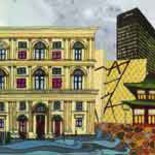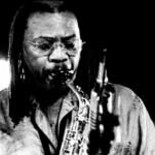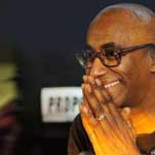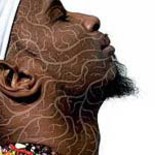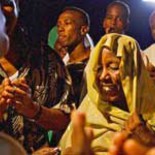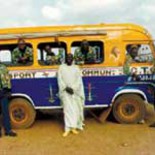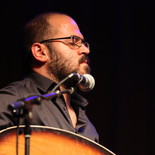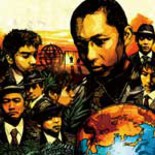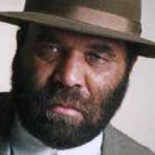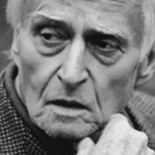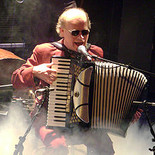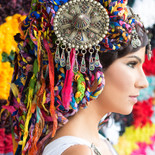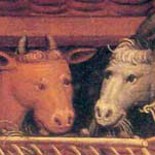Der sudanesischer Oud-Star Omer Ihsas kommt mit seiner 12-köpfigen Band nach Innsbruck!
OMER ISHAS & THE PEACE MESSENGERS (DAFUR/SUDAN)
Omer Ishas:Komp & Voc
Omer Kafi:Guit
Abdol Shafia:E-Bass
Alfaith Mohamed:Akk
Mousa Mohamed Ibrahim:Trompete
Arwa Arrabe:Vio
Mouawia Zayed:Bongos
Hatim Gismalla:Congas
Hassan Khidir:Key
Nahid Abdolrasul Abballa Azrag:Voc
Nawa Awad Bushra Ghafur:Voc
"I am an artist and that is a tribe by itself" (Ich bin ein Künstler und das ist ein eigener Stamm)
Der charismatische Sänger und Komponist Omer Ihsas setzt sich seit 17 Jahren weltweit für den Frieden ein. Der preisgekrönte Musiker aus der afrikanischen Krisenregion Darfur ist Frontman der 1992 gegründeten sudanesischen Band "Peace Messengers".
Ihsas ist Pionier und Erfinder der vibrierenden "Modern Sudanese Music", die er vorzugsweise auf einem der ältesten arabischen Musikinstrumente, dem Oud komponiert und auf "moderne" Instrumente umsetzt. Die kraftvollen Kompositionen sprühen vor überschäumender Lebensfreude und berühren das Herz, nicht weniger als die tiefgründigen Texte über Liebe, Frieden und Tradition, die von ihm oder Poeten seiner Heimat stammen. Afrikanische traditionelle Rhythmen und arabische Tunes treffen auf hypnotische Melodien und mitreißende Percussionelemente, die selbst den größten Tanzmuffel zur Bewegung verführen.
Über die Konzerte hinaus wirkt Ihsas in seiner Heimat als "Artificial Ambassador": Regelmäßig tritt er in Krisengebieten und den Camps von Darfur auf, unterstützt NGOs bei ihrer Arbeit oder wird, nicht zuletzt aufgrund seiner intellektuellen Fähigkeiten und Feinsinnigkeit, zu Friedensveranstaltungen eingeladen.
Das begeisterte Publikum dankt es ihm bei seinen Konzerten stets mit stürmischem Applaus und Standing Ovations. Wird wohl im Treibhaus nicht anders sein.
In Kooperation mit dem Festival "Salam Orient"
o-o-o-o-o-o-o-o-o-o-o-o-o-o-o-o-o-o-o-o-o-o-o-o-o-o-o-o-o-
Omer Ihsas is one of the most respected singers and composers of Darfur. He has led a band for 19 years, composing songs that have helped sensitize the nation to the rich culture and profound challenges of his home region. At a time when many of Sudan?s most accomplished artists no longer live in the country, Ihsas is a model of commitment to his country, remaining on the scene from city stages to refugee camps, using music as a persistent force for change, and to bring a better future.
Ihsas was born in 1958 in Nyala, Darfur. His mixed Arab and African heritage makes him a quintessential Darfurian. This vast region borders Chad, Central African Republic, and Libya, and so is fantastically diverse culturally. That diversity was the charm of Ihsas?s youth. ?Nyala is one of the most beautiful, serene, civil places I?ve ever known,? recalls Ihsas. ?When I was young, it was quite different from now. Different tribes gathered peacefully every year for celebrations with dancing and singing. We lived together naturally.? That unity has been savaged today by decades of neglect and divide-and-rule tactics from a hostile government in Khartoum. But it lives on in Ihsas?s memory, and it is his life?s dream to see it restored.
After he began singing in 1977, Ihsas went to Khartoum in 1981 and auditioned to study at the Institute of Music and Drama. He is a natural talent with a powerful voice that is also capable of great sensitivity and nuance, so it?s no surprise he passed with flying colors. He auditioned with an Arabic song that speaks of ?feeling,? in Arabic, ?Ihsas,? and this immediately became his stage name. Initially, Ihsas worked at fitting into the music scene in Khartoum, mostly imitating what other artists were doing. ?I tried to be accepted,? he recalls, ?but I realized that this was not the right goal. They were limited to 5 or 6 styles of music. I wanted to bring the richness of Darfur to the world.?
The Sudanese sound had been created when artists brought their unique traditions to Khartoum and Omdurman and found successful ways to modernize them. Ihsas knew this was also possible for the diverse rhythms and modes of Darfur, but he was determined not to distort his sources in the process. ?I did not intend to change the music,? he says. ?I wanted to present it as it is, then just develop it a little, mostly by adding instruments.? Eventually, he found himself leading a 16-piece band with three violins, saxophone, trumpet, keyboards, accordion, percussion, bass and guitar. In 1996, Ihsas added twelve dancers, creating a full-force stage experience the likes of which no Darfur artist had ever delivered before.
The music of Darfur is a mix of complex African rhythms?many of them 12/8 variants?but it is also informed by Arabic music, and importantly, the most mystical side of Islam. ?We are Sufis,? says Ihsas. ?We draw from hakeba, folkloric Sufi music, which uses the riq [a small frame drum], the most popular Sufi instrument.?
After 1989, Ihsas, like so many other Sudanese musicians, faced harassment and arrest at the hands of the new Islamist state. He understood that he had to address the political realities of Sudan in his compositions, but in a positive way. ?We are singers,? says Ihsas. ?We sing love songs first. But the conscience of a singer is with the people, and with the land. My conscience woke up.? In 1991, he composed one of his most famous songs, ?Darfur, Our Homeland.? Ihsas knew that the problems in Darfur had deep roots. As with the conflict in the south of Sudan, the real issue was not religion or ethnicity, but rather unequal development and the government?s unwillingness to share the country?s resources with any region where its political support was weak. At the height of the north-south civil war, Ihsas performed with a major singer from the south, as a sign of solidarity.
Ihsas has struggled to champion the culture and plight of Darfur while still promoting the idea of a unified Sudan. This has been no easy task, given the divisive politics of the 1990s. ?People accused me of fomenting tribalism,? recalls Ihsas, ?Of enclosing myself in Darfur. But no, I was singing for all of Sudan. I?m a Sudanese singer, singing Sudanese songs, in the name of Sudan. This is why I call my music Sudanese songs from Darfur. Now many other singers are using this idea.?
Recording music is also not easy in Sudan. Ihsas and his band recorded an album called Imagine in Austria in 2005. But most Sudanese know him through his mesmerizing stage performances. Ihsas travels throughout the Sudanese diaspora, but keeps his home in Khartoum along with his ?two families,? his wife and four kids on the one hand, and his band on the other. Despite all the violence, chaos and danger, he continues to perform in Darfur today. He feels that the multi-cultural nature of Darfur?s music holds the key to resolving the conflict, for the divisions that tear tribe from tribe have been introduced during his lifetime, and thus can be ended. ?First the fighters from must come together,? says Ihsas. ?Then we can have hope. I ask for this in my songs.?
